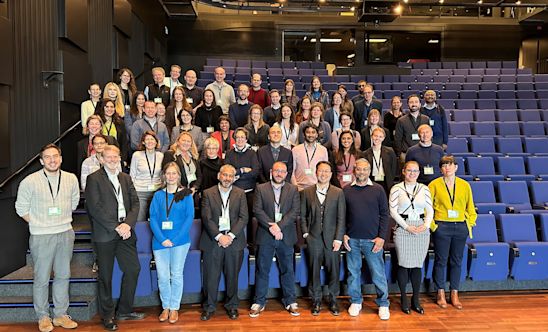EPND Annual Meeting welcomes collaborators from our 29 partner organisations
12/15/2022

The first EPND Annual Meeting was held last week between 8 and 9 December, in Amsterdam, the Netherlands, and online. We were delighted to welcome almost 80 colleagues from our 29 public and private partner organisations, joining us from 13 countries across Europe and beyond. On the agenda: sharing updates on progress, addressing challenges, making plans for year 2 of EPND – and lots of brainstorming.
“We believe that re-use of data and samples will be the key to better treatments, diagnostics and trials for Alzheimer’s, Parkinson’s and other neurodegenerative diseases.”
The first session of the Annual Meeting started with a recap on progress from Pieter-Jelle Visser (University of Maastricht), who co-leads EPND together with Niranjan Bose (Gates Ventures), Tony Brookes (University of Leicester) and Phil Scordis (UCB). Setting the scene for the next two days of discussions, Pieter-Jelle explained how EPND will accelerate the identification and validation of biomarkers for neurodegenerative diseases, summarising key developments from workstreams focusing on technical platform development, standard operating procedures, data governance, sustainability, and more.

Spotlight on the Cohort Catalogue
Colleagues from the Luxembourg Institute of Health, Maastricht University, and Gates Ventures, who are co-leading work on the involvement of cohorts in EPND, showed how they are creating a community to foster collaborative neurodegenerative disease research. This has laid the groundwork for an important project achievement: the recent launch of our Cohort Catalogue, which brings together information on over 60 neurodegenerative disease cohorts in Europe. The Cohort Catalogue, which is publicly available via the EPND website, hosts searchable metadata on research participants, samples, imaging, cognitive data and more, allowing users to discover research activities and create new collaborations.
Cohort involvement activities have driven content creation for our Cohort Catalogue. Elsewhere in EPND, teams have been hard at work developing its technical infrastructure. During the Annual Meeting, Matt Clement and Vijay Sureshkumar (Gates Ventures) explained how the Catalogue functionalities will be expanded over time, supporting the development of record-level discovery tools, which leverage existing data and sample infrastructures, and are connected to the Alzheimer’s Disease Data Initiative (ADDI) AD Workbench.
Case studies and SOPs
One tangible research output from the EPND catalogue and community will be the EPND case studies. Designed to answer biomarker research questions, and road test the EPND platform, our case studies will explore a range of different biomarkers, including components of the ATN staging system, complement cascade, and microbiome. Claire Chevalier (University of Geneva) provided an update on these case studies, which have identified several contributing cohorts and analysis platforms, and are now working to assemble biosamples and supporting datasets. In the future, these case study results will be incorporated back into the EPND platform, to drive continued data access and innovation.
Standard Operating Protocols (SOPs) are an essential part of any biomarker toolkit, as they assure consistency in sample and data quality. Greater consistency means more accurate and reliable biomarker test results, a major concern for medicines regulators, doctors and patients alike. Focusing on this important topic, Charlotte Teunissen (Amsterdam UMC) outlined recent progress on developing, updating and harmonising SOPs, which will be used in the EPND case studies, and support new cohort collections of fluid and digital biomarker samples.

Data governance: challenges and recommendations
Trustworthy, ethical data governance that complies with the General Data Protection Regulation (GDPR) is a key concern for EPND. We therefore have a dedicated workstream to tackle this complex task, providing ethico-legal guidance and developing a governance framework for EPND. In their presentation to Annual Meeting attendees, workstream leads Phil Scordis and Davit Chokoshvili (University of Luxembourg) described the governance challenges facing EPND, detailing the analyses that form the backbone of the first EPND White Paper. This White Paper, which will be published in early 2023, identifies legal and governance requirements for data and sample sharing, and articulates strategic recommendations for the EPND consortium to follow.
Sustainability by design and stakeholder engagement
As a platform for sample and data sharing, EPND aims to support the sustainability of neurodegenerative disease research studies. In turn, EPND wants to ensure that it is a scalable, self-sustaining entity by the end of the IMI funding period. Anton Ussi, Alex Gardiol (EATRIS) and Raj Long (Gates Ventures) are spearheading the sustainability work in EPND, and explained how they are developing a business plan and exploitation strategy to ensure the long-term success of our project.
Supporting sustainability efforts and activities elsewhere in EPND, the engagement workstream is creating a forum for stakeholder involvement, and driving outreach to stakeholders that include researchers, policymakers, medicines regulators, patients and caregivers. In their update to Annual Meeting participants, Angela Bradshaw, Dianne Gove (Alzheimer Europe) and Marjon Pasmooij (CBG-MEB) outlined the stakeholder engagement framework for EPND, highlighting efforts to involve patients and caregivers, describing regulatory activities, and identifying priorities for communications and awareness campaigns in the coming year.
We would like to thank all our partner organisations and colleagues for their contributions to EPND in year 1, and for their active participation in discussions and brainstorming during our Annual meeting! We’re looking forward to another successful year for EPND, with even more progress towards our mission: to accelerate the discovery of diagnostics and treatments for neurodegenerative diseases, by remove barriers to data and sample sharing, and fostering collaboration.
Stay tuned for updates on progress and new EPND developments! Sign up to our newsletter here.